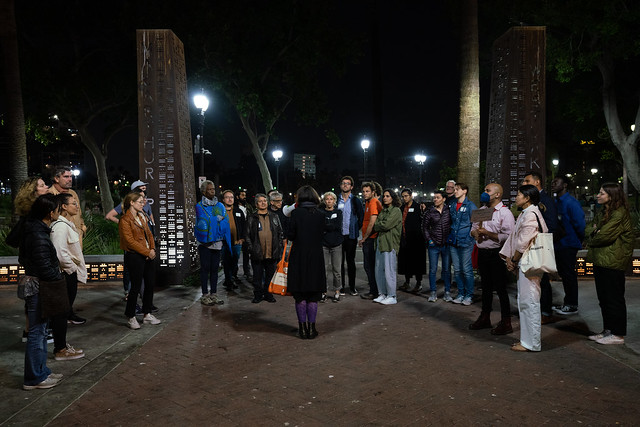By Stan Paul
UCLA Luskin has a new rising star for 2022.
Whitney Willis, operations manager for the Institute of Transportation Studies (ITS) and the Lewis Center for Regional Policy Studies at UCLA Luskin, has been named this year’s Rising Star awardee by UCLA’s Administrative Management Group in partnership with Campus Human Resources.
The 2008 UCLA alumna, who has worked at the Luskin School for nearly six years, was selected from among 14 nominees in the Rising Star category, one of three Excellence Awards bestowed annually to UCLA staff members. Criteria for the award include the potential to make a positive impact, establishing a leadership role, and pursuing both training and development opportunities.
Willis exemplifies these criteria and more, according to UCLA Luskin supervisors and colleagues who consider her not only a rising star, but already a star.
Willis’ supervisor Juan Matute, deputy director of ITS, describes her as an out-of-the-box thinker who has streamlined and automated a number of the center’s business systems and services. During her time at the School, Willis has established best practices for administration, events and student oversight, while lending support and training to staff from other UCLA Luskin research centers, he said.
In addition to training herself in process improvement and learning to use new tools, Willis has sought formal training from within and outside UCLA, Matute added. She completed UCLA’s Professional Development Program in the 2019-20 academic year and is now pursuing a master’s in public administration at Cal State Northridge. Matute said she is already applying what she is learning to budgeting and financial analysis tasks at UCLA.
Willis also serves as an advisor for the UCLA Staff Assembly’s Equity, Diversity and Inclusion Task Force.
In a letter of support, Professor Evelyn Blumenberg, who is Willis’ supervisor in her role as director of the Lewis Center, noted the challenges of Willis’ position, which involves managing a diverse portfolio of responsibilities. These include grant administration and reporting, budgeting and resource management, administrative support for events, management of facilities projects and the distribution of financial aid.
“Ms. Willis’ leadership, exceptional organizational skills and commitment have been integral to the success of the Lewis Center,” Blumenberg said.
Despite time constraints, keeping up with her graduate school classes, and the day-to-day working challenges of the academic year, Willis says she has always viewed her role as operations manager as striving to be a “champion of productivity within ITS and Lewis Center.”
“This award is special to me because it means that I might be even a small part of a community of so many other great people who are committed to doing their best in serving students, diverse communities, and supporting the growth and well-being of the staff community,” Willis said.

